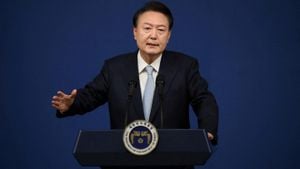Truong My Lan, the Vietnamese real estate mogul, is facing the reality of her situation after a court upheld her death sentence connected to the country’s biggest fraud scandal. This scandal, deemed particularly severe by Vietnamese authorities, has vast repercussions, not just for Lan but also unraveling the complex fabric of business and ethical standards within Vietnam's corporate sector.
On December 4, 2024, during the session at the High People’s Court in Ho Chi Minh City, Lan's appeal against the penalty was dismissed outright. The presiding judge didn’t mince words when discussing the impact of her actions, stating the total loss involved was "huge, with extremely serious consequences" and emphasized there was "no basis to reduce the penalty." This firm stance from the judiciary highlights the country's zero-tolerance policy toward corporate corruption.
Truong My Lan was accused of masterminding fraud involving massive amounts of money. Allegations suggest she misappropriated funds through various means, deeply impacting investors and contributing to instability within the financial sector. Under Vietnamese law, individuals convicted of particularly egregious financial crimes can face the death penalty, which is what Lan is now up against.
What’s unique about Lan's case is the legal route she may still pursue to save her life. The Vietnamese legal system allows for commutation of the death penalty to life imprisonment if the convicted party makes significant restitution. Specifically, Lan must repay around three-quarters of the estimated $12 billion she allegedly defrauded. This opens up new avenues for negotiation, as she now has seven days to decide on her next steps, which may also include seeking clemency from the Vietnamese president, Luong Cuong.
The corruption charges against her reveal underlying challenges within Vietnam’s rapidly growing economy. While the government pushes for foreign investment and development, high-profile cases like Lan’s shine light on the reality of graft and corruption. With such hefty financial penalties and dire consequences for wrongdoers, the case might deter potential fraud but also raises concerns about the chill such harsh measures might enforce on entrepreneurship and business endeavors.
This ruling has sparked discussions among both legal experts and business leaders about the future of corporate governance and ethical standards within Vietnam. Many are left wondering where the balance lies between strict enforcement of law and the nurturing of business integrity.
Besides legal consequences, the societal impact of this case is also reflecting growing discontent among the public, who increasingly demand accountability and transparency from those at the top. Vietnam's anti-corruption campaign, which has been likened to a “blazing furnace,” aims to crack down on malpractices across many sectors. It finds its roots not just as a reaction to public outrage, but as part of broader reforms necessary for sustainable growth.
Ironically, some critics argue the extreme measures being adopted today might be backlash from the earlier laissez-faire attitudes prominent during the rapid economic growth phases of the last few decades. Vietnam's economic reform traditionally focused on opening markets and enhancing foreign competition but failed to address fundamental governance frameworks for the businesses involved.
Emerging from decades of war and economic hardship, Vietnam has garnered respect on the world stage for its transformative power, but incidents involving high-profile individuals facing severe penalties could damage its image. This incident with Truong My Lan may hinder foreign investments if potential investors perceive the risk outweighing potential profits.
The wider ramifications of this case could affect various sectors, particularly real estate, which once enjoyed rapid growth and investments. Investors now may hesitate to commit substantial capital without appropriate assurance of safeguarding their interests. This speaks volumes about the necessity of strengthening legal frameworks to build trust.
What happens next remains to be seen. Will Truong My Lan’s appeal for clemency succeed, or will she become another cautionary tale of corporate excess? While she has options to pursue her case, many observers are skeptical about her chances. The next few weeks will be telling as she weighs her options against the backdrop of a country's firm stance against corruption.
The case of Truong My Lan is not just about one woman facing the ultimate price for her actions; it reflects broader societal issues, unpacking Vietnam's complex relationship with corruption, economic growth, and the ethical dilemmas facing its future.



